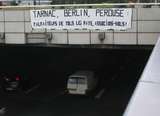
2009-07-22
On 16 and 17 July [2009], three German comrades were summoned by judges in Berlin and Hamburg, in the framework of the "Tarnac Affair." In Berlin, following a gathering in front of the French Embassy, they were brought before a judge to whom, in conformity with what they said, they made no statements. The German authorities were responding to the rogatory commission launched by Judge Fragnoli, who based his suspicions about the two Berliners on the fact that, ten years ago, they had been arrested and released following a campaign that sabotaged train lines to protest against the shipments of nuclear wastes over them.
Two weeks ago, in Perouse [Italy], two companions were thrown in jail, following a vast operation by the media and the police that merits attention. While the newspapers (Le Nouvel Observateur in France and all of the Italian press) congratulated themselves that two dangerous terrorists had been arrested at the moment they were trying to sabotage train lines, it came out that, in fact, it was 16 months ago that the two companions had been spotted by the Italian federal police not far from a railroad line and that the police didn't arrest them so as to be able to continue to surveill them.

The terms in which the forty searches and the arrests of thirty-seven people (charged with "organization of and participation in a subversive association of anarcho-insurrectionalist inspiration that seeks to commit criminal acts with the purpose of terrorism and overthrowing the democratic order") have the same laughable grandiloquence as "Operation Taiga," this time called "Operation Shadow." Here one also flatters oneself with having "neutralized a dangerous anarcho-insurrectionalist cell," since the investigation established "the concrete risk that the arrested parties could, in pursuit of their project, commit offenses of the same type or even more serious ones, which are unforeseeable but inescapable." Lacking the ability to reproach the two in prison with actually sabotaging the train lines, one has accused them of having the intention to do so. And even if they are finally cleared, the procedure will at least have had the merit of putting them under pressure. As with "Tarnac," here it is a question of manuals of sabotage, fanzines communicating black projects, hypothetical campaigns of destabilization, this time coordinated with people in Greece and Spain. One will not be disorientated by learning that the Italian police forces have created their own FAASI,[1] which no longer means the "French Anarcho-Autonomous Sphere of Influence," but the "Florentine Anarcho-Autonomous Sphere of Influence." Quite obviously, these raids came a few days before the meeting of the G8. The local anti-terrorist unit (the Regrouping of Special Operations) judged the moment opportune to try to dissuade and disorganize any contestation, and not so much to prosecute an intention to sabotage that was more than a year old. But it was [Antonio] Tajani, the European Commissioner of Transportation, who provided the key to so many happy similarities: immediately after the raids, he gave comical "compliments to the ROS[2] for having frustrated an attack upon the security of rail transport," and then proclaimed, "Europe is on Italy's side concerning what reinforces security."
The summoning of the German comrades, the Italian raids, and the deployment of anti-terrorism against the "anarcho-autonomous" peril in France reveals one and the same imperial strategy, employed at the European level: the strategy of neutralizing political subversion. They conspire against use internationally; thus it is internationally that we must conspire against them.
French-German Friendship Lives![3]
Up with international solidarity![3]
Free all of them![4]
[1] In French, the initials are "M.A.F.," which suggests MAFIA.
[2] The "Special Operations Group" of the carabinieri.
[3] German in original.
[4] Italian in original.